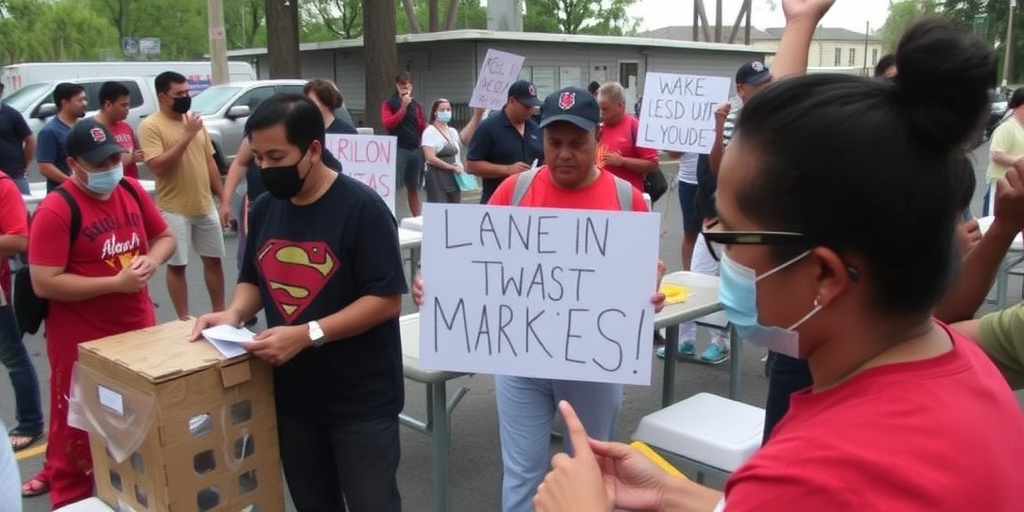Now Reading: Undocumented Workers Stay Home Amid Deportation Fears
-
01
Undocumented Workers Stay Home Amid Deportation Fears
Undocumented Workers Stay Home Amid Deportation Fears

Title: Fear Grips Undocumented Workers Amid Immigration Crackdown
In downtown Freehold, New Jersey, the railroad tracks that once bustled with day laborers waiting for work have grown eerily quiet. Once filled with dozens of mostly undocumented men, many of whom hail from Latin America, seeking opportunities in fields like construction and landscaping, the scene has shifted significantly. Mario, a 55-year-old laborer from Mexico, noted that in recent weeks, the silence was deafening. “Because of the president, we have a fear,” he said, highlighting the profound anxiety that permeates the immigrant community under the current administration.
This growing fear among undocumented immigrants is not confined to Freehold; it is felt across the United States. From urban areas to agriculture-rich regions, workers in various sectors, including nursing homes in Arizona, poultry plants in Georgia, and restaurants in Chicago, have been disproportionately impacted by the tightening immigration policies. This widespread anxiety resonates as President Trump’s administration pushes forward with plans for mass deportation and increased immigration enforcement operations.
The ripple effects of these policies are substantial, with many undocumented workers opting to stay home, leading to labor shortages in industries that heavily rely on immigrant labor. This situation presents challenges for sectors such as residential construction, agriculture, senior care, and hospitality. Rebecca Shi, CEO of the American Business Immigration Coalition, warned that businesses are beginning to recognize the impending consequences of losing their workforces, including rising food prices and the struggle of restaurants and grocery stores to maintain operations.
An estimated 20 percent of the U.S. labor force is foreign-born, with many immigrants lacking legal status. The ongoing deportation threats exacerbate an already precarious situation. While some workers are shielded from deportation under temporary protected status—a program for nationals from countries in crisis—recent announcements signal impending changes that may dismantle these protections.
In the agricultural sector, where immigrants make up a substantial portion of the workforce, the implications of a dearth of labor are severe. Farmers like Tom Deardorff, who operates Deardorff Family Farms in California, have witnessed firsthand the crucial role that immigrant workers play in ensuring a steady food supply. Deardorff previously provided his workers with identification cards to verify their status as essential workers during the pandemic; now, many fear the consequences of potential deportation.
The construction industry similarly faces challenges from the labor shortages posed by immigration crackdowns. Independent estimates indicate that up to 19 percent of construction workers are undocumented, with an even higher percentage in certain states. Experts argue that any removal of these workers will only exacerbate existing labor shortages, ultimately resulting in slower project timelines and increased costs.
The senior care sector presents another critical area of concern. With the aging population and a rising demand for caregivers, the industry has increasingly turned to immigrant labor. Adam Lampert, CEO of Manchester Care Homes in Texas, explained that about 80 percent of his caregivers are foreign-born, reflecting a reliance on immigrant labor to meet the needs of an aging population. As recruitment challenges continue to mount, the looming prospect of mass deportations poses significant risks for both care providers and their clients.
The fear of enforcement actions has created a chilling effect within these industries, as workers anticipate raids and increased scrutiny from immigration authorities. In Princeton, New Jersey, a group of day laborers recently convened to discuss their fears and concerns regarding their immigration status. One worker voiced a poignant question: “What white person is going to do these jobs?” This sentiment underscores the vital role that immigrant workers play in the economy, especially in low-wage, labor-intensive positions that many native-born Americans often overlook.
As advocacy groups continue to mobilize in response to these developments, the push for comprehensive immigration reform remains crucial. Industry leaders and local officials emphasize the need to address the challenges posed by labor shortages and the reliance on immigrant workers. Without meaningful reforms, the U.S. risks experiencing significant economic repercussions that could reverberate through various sectors, ultimately affecting American consumers and communities nationwide.
In summary, the tightening immigration policies under the Trump administration have not only instilled fear in undocumented workers but have also raised critical concerns about labor shortages in essential industries. As communities and industries grapple with the potential consequences of mass deportations, the reliance on immigrant labor becomes increasingly apparent. The need for comprehensive immigration reform is evident to ensure the sustainability of the economy while protecting the rights and livelihoods of those who contribute to it.
Stay Informed With the Latest & Most Important News
Previous Post
Next Post
-
 01New technology breakthrough has everyone talking right now
01New technology breakthrough has everyone talking right now -
 02Unbelievable life hack everyone needs to try today
02Unbelievable life hack everyone needs to try today -
 03Fascinating discovery found buried deep beneath the ocean
03Fascinating discovery found buried deep beneath the ocean -
 04Man invents genius device that solves everyday problems
04Man invents genius device that solves everyday problems -
 05Shocking discovery that changes what we know forever
05Shocking discovery that changes what we know forever -
 06Internet goes wild over celebrity’s unexpected fashion choice
06Internet goes wild over celebrity’s unexpected fashion choice -
 07Rare animal sighting stuns scientists and wildlife lovers
07Rare animal sighting stuns scientists and wildlife lovers




















